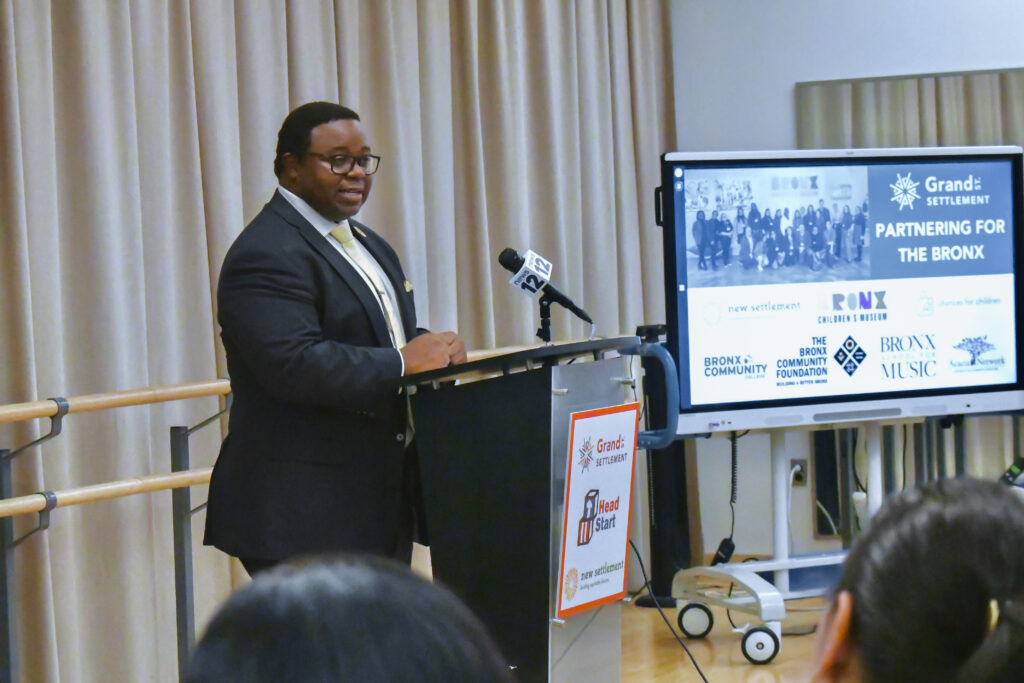

A prominent New York City landlord has come under fire by tenants who live in one of its buildings in Sunnyside, with many of them accusing the property owner of shoddy management and harassment.
The tenants at 43-17 48th St. in Sunnyside held a rally on Saturday, Sept. 21, outside their building—owned by Bronstein Properties—to draw attention to the company’s building violations, alleged retaliation against tenant organizing and illegal deregulation of rent-stabilized apartments. One tenant also alleges sexual harassment from a super.
The rally was organized the Bronstein Tenant Union, alongside member organizations from the Right to Counsel Coalition.
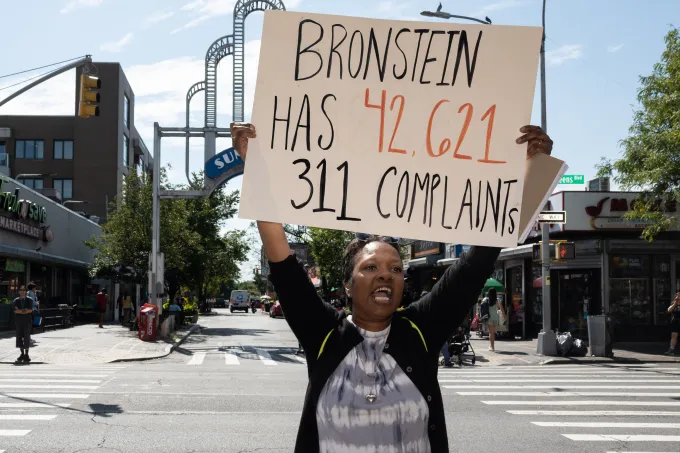
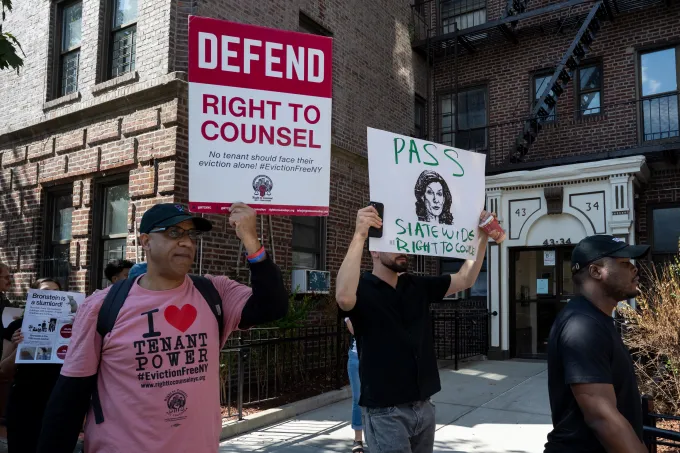
The tenants took aim at Bronstein Properties, owned by Barry Rudofsky and Scott Silverman. They noted that tenants have filed 42,616 complaints with the Department of Housing Preservation and Development (DHPD) across its 120 properties—consisting of 6,500 apartments—in New York City and Long Island throughout the years. Complaints and violations range from lack of heat, water leaks, roach and rat infestation, brown water and collapsing ceilings to mold and lead, among others.
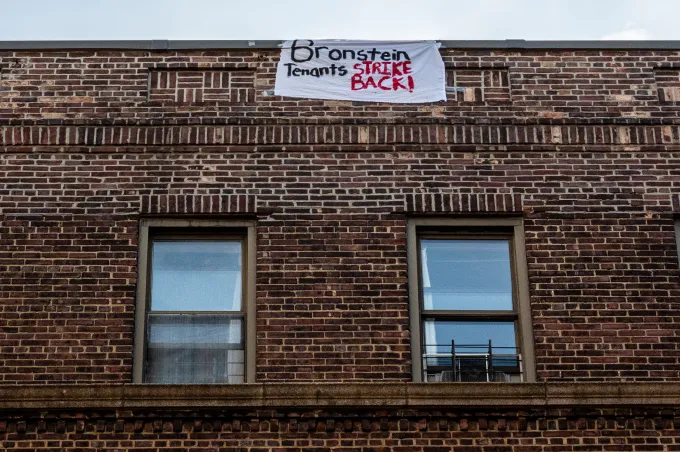
The rallygoers outside the 6-story, 95-unit Sunnyside building at 43-17 48th St. noted that Bronstein had racked up 61 complaints in the last two years and has 40 open violations, including collapsed ceilings and lead, according to DHPD. While the rally was taking place, a DHPD inspector with the Division of Code Enforcement was seen leaving the building.
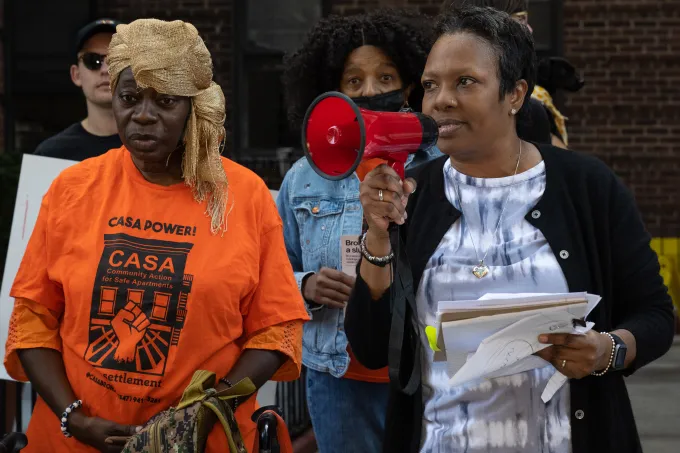
At the rally, Yvette Allen-Janis, a tenant of Bronstein Properties, told the crowd that the tenant union had reached out to Bronstein Properties via email and phone calls numerous times to address the issues. They eventually met with Bronstein Properties on Nov. 14, 2023, handing them papers with the building violations that needed to be addressed; however, “Ten months later, we are still waiting for repairs to be done,” Allen-Janis said.
One tenant described the lack of response to repair the unsafe conditions as “abhorrent.”
“We need to get timely responses and proper repairs made to our apartments so that we can continue to live in our apartments and do not have to worry about moving out because our entire bathroom ceiling fell and there was a mold in there, or that our living room apartment ceiling fell on our heads,” the tenant said, drawing chants of “no repair, no rent” from the crowd.
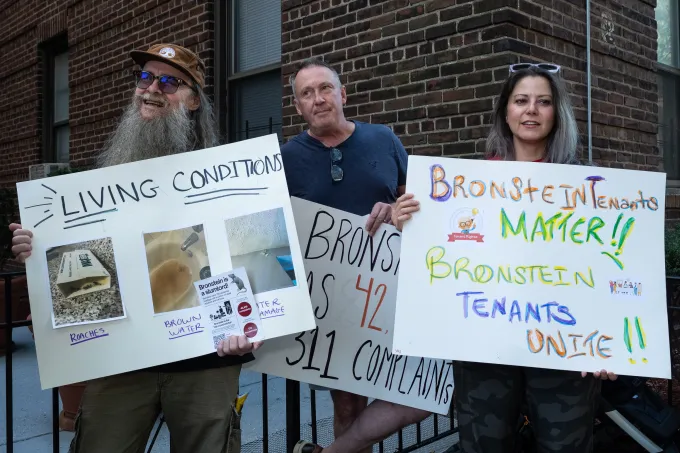
Tenants told QNS that one unit did not have gas for seven months, while another tenant had issues with mold in her apartment, forcing her to move in with friends because she is allergic to mold and could not breathe.
“It took months to get them to do anything about it,” she shared.
Another tenant expressed concern about the building’s structure and pointed out a crack in the exterior wall. She also shared with QNS that her kitchen floor was broken, and she eventually filed a complaint with DHPD to get it repaired. Another time, a century-old pipe burst in her bathroom.
“One hundred years’ worth of fecal matter that sprayed throughout our bathroom, and [Bronstein] refused to clean it up. They said it was on us to clean it up, and they left an open hole in our ceiling for a week,” she said.
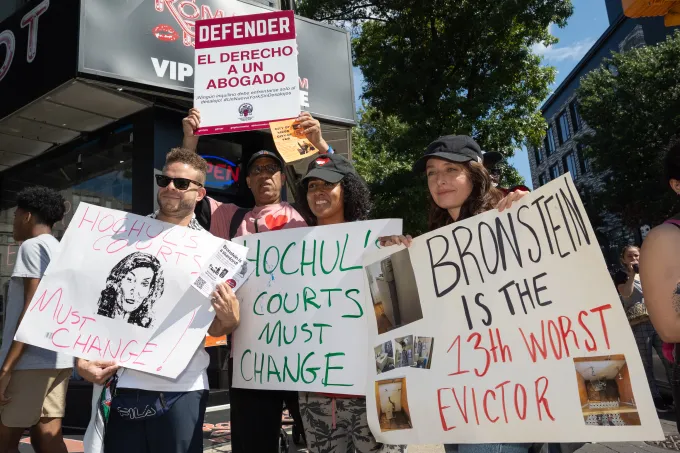
Tenants also accused Bronstein of illegally evicting tenants so the company could deregulate rent-stabilized apartments.
“We used to have more stabilization, but what they do is they evict people, and then they illegally destabilize [the apartment]. They do repairs. They’ll put in a backsplash and then charge $3,000,” said one tenant. “There’s Airbnbs here. It’s ridiculous.”
Since 2017, Bronstein Properties has evicted 176 households, and the COVID-19 pandemic worsened the eviction crisis in New York State. During the height of the pandemic, Bronstein sued 388 households for eviction between March 2020 and Sept. 20, 2021, earning the company the number 13 spot among New York City’s worst evictors during the pandemic.
Bronstein disputed many of these claims and took aim at the organizers of the rally.
“We are aware of a recent rally organized by groups that resorted to disseminating misinformation and distorting data and were frankly disturbed by the tenor of the rhetoric,” said a spokesperson for Bronstein Properties in a statement. “When groups that purport to represent our residents prioritize soundbites to push their legislative agenda rather than focus on improving New York housing, everyone loses.”
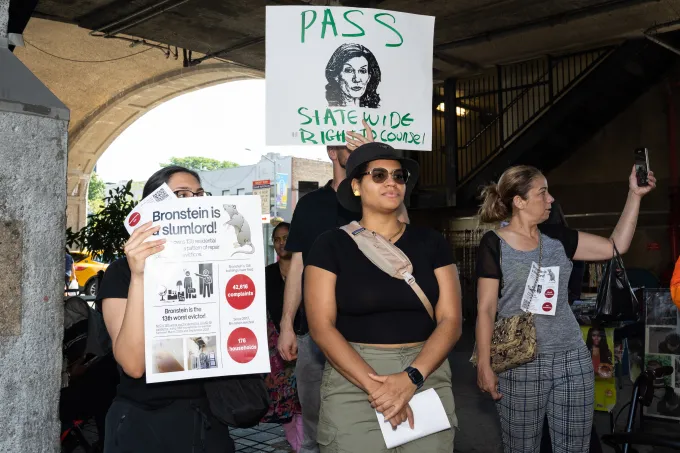
Rallygoers call for state protections
Nearly 92,000 New Yorkers are currently unhoused—New York State has the highest rate of homelessness in the country—and around 175,000 New Yorkers are facing eviction, most of them having to go through the process without legal representation due to financial distress.
Rally-goers also pushed for the passage of a slew of tenants’ rights legislation on the state level, which include:
The Statewide Right to Counsel bill (S2721/A1493), introduced by then-Assembly Member Latoya Joyner (D-Bronx) and state Sen. Rachel May (D-Central New York), would guarantee all tenants across New York State the right to a lawyer when facing eviction if it were to become law—similar to New York City’s right to counsel law, which passed in 2017. To make sure that the state court system upholds the local law, state Sen. Brad Hoylman-Sigal (D-Manhattan) and Assembly Member Linda Rosenthal (D-Manhattan) introduced the Defend Right to Counsel bill (S3254/A4993).
Another bill, the Winter Moratorium Evictions Act (S1403/A4093), sponsored by Sen. Zellnor Myrie (D-Brooklyn) and fellow Democrat, Assembly Member Dr. Anna Kelles, would prohibit evictions of tenants from residential properties during the winter months, while the Clean Hands Bill (S6769/A1853), sponsored by state Senator Kevin Parker (D-Brooklyn) and Assembly Member Rosenthal would prevent landlords from evicting tenants if they do not maintain their buildings.
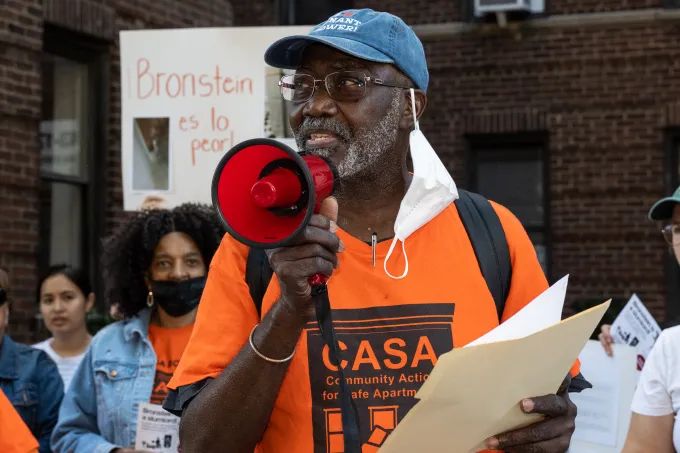
Fitzroy Christian, a tenant leader with Community Action for Safe Apartments (CASA), explained why laws like the Statewide Right to Council are important for tenants statewide.
“So that when [Bronstein] takes all of their tenants to court, we have the protection that we need to make sure we can stay in our homes, get our repairs and be able to live as human beings here in New York City,” Christian said. “The bill ensures representation for tenants in a variety of cases, not just formally eviction proceedings, and it has also an enforcement mechanism that ensures cases cannot proceed until tenants have access to their right to council.”

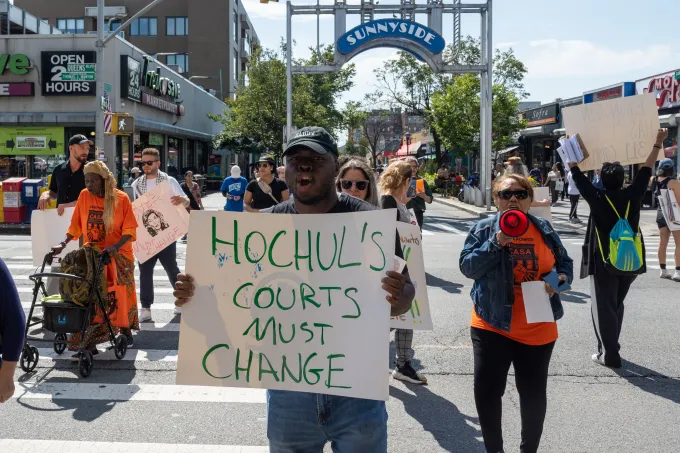
Bryan Fotino, tenant organizer at the Right To Counsel Coalition, told QNS that Bronstein Properties needed to make the repairs.
“If you’re not maintaining the buildings, you do not have the right to evict tenants,” Fotino said.
Fotino also demanded that the building supers stop interfering with tenant organizing, like tearing down flyers or preventing them from trying to talk to tenants, which is a “violation of New York Real Property Law section 230.” He shared that a super tried to prevent him from leaving the building during one tenant-organizing event.
“I was stuck in the building for like two minutes,” Fotino told QNS. “I kept trying to leave, but he kept putting his arm up. I don’t live in the building, so I get to leave, but the tenants have to deal with this harassment all the time; I really feel bad for them.”
Bronstein Properties disputes the accusations and says that it does a good job in managing its portfolio, given the age of many of its buildings.
“For over 60 years, Bronstein Properties has been proudly dedicated to resident satisfaction,” the spokesperson said. “Despite the challenges posed by New York’s aging buildings and the increased costs associated with maintaining these properties, we take great pride in maintaining them and being responsive to our residents’ needs. Any assertions to the contrary are fundamentally untrue.”
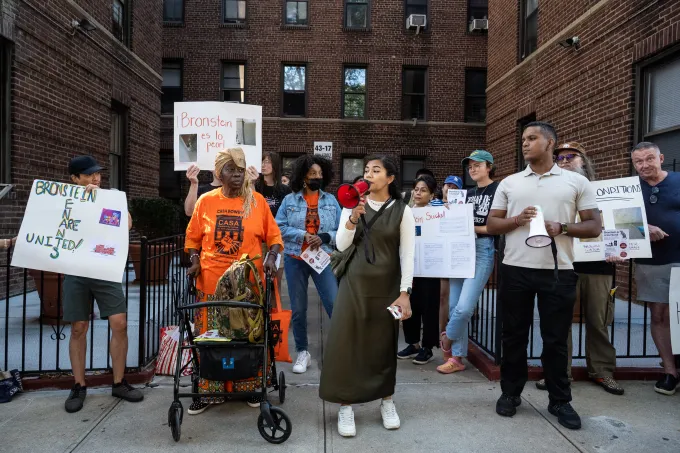
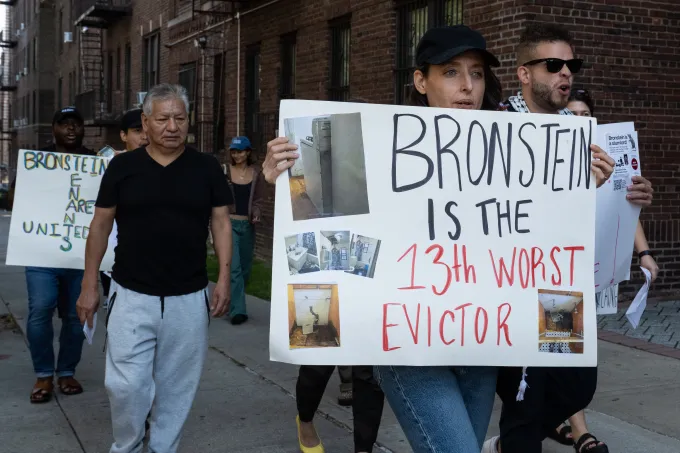
Originally published on September 24, 2024 By Gabriele Holterman | Sunnysidepost


